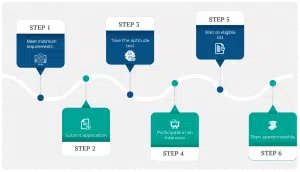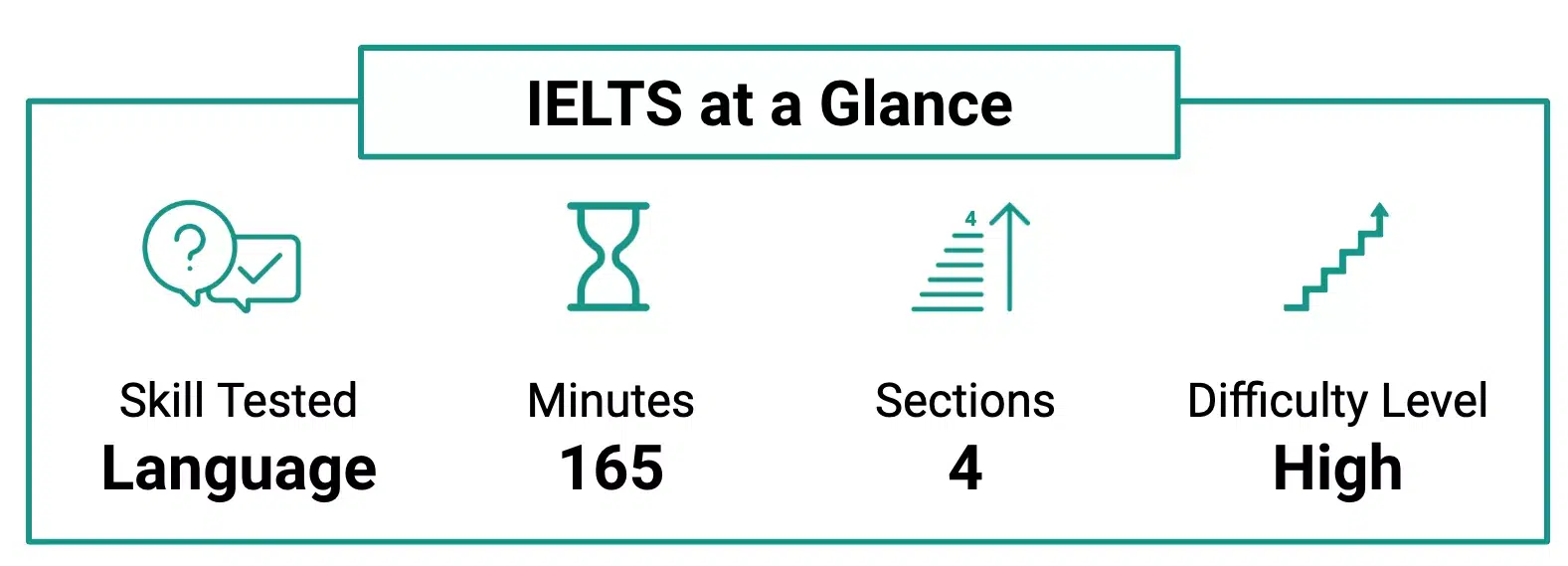IELTS, the International English Language Testing System, is a standardized test that helps to gauge the English proficiency of non-native English speakers.
Launched by Cambridge English Language Assessment and the British Council, the test’s innovative format will gauge your communicative language learning skills.
Did you know?
The IELTS General Training Test is used to assess the level of English proficiency of people who want to immigrate or get a work-visa in English-speaking countries. It has 4 sections: (1) listening, (2) reading, (3) writing, and (4) speaking. A score of 6 indicates competency in the English language. Successful test-takers need to be prepared for multiple English accents.
IELTS is one of the major English language tests given to students preparing for study, migration, and work. Accepted by 3,000 academic institutions and universities in countries such as Australia, Canada, U.S, England, Ireland, and New Zealand, it is designed to test students from English newbies to experts.
You have to pass the test’s Listening, Speaking, Reading, and Writing sections to work or study in countries where English is the main language.
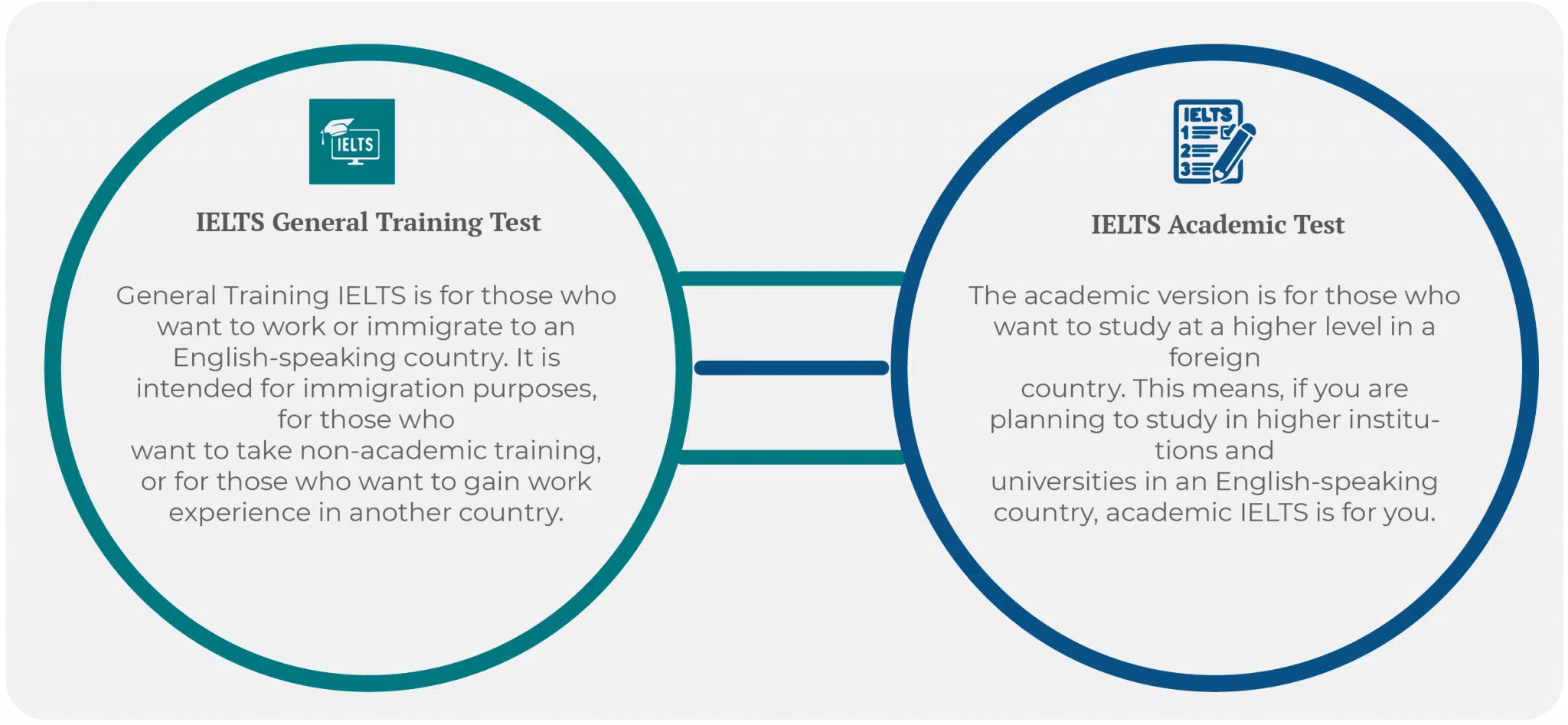
The 2-hour 45-minute IELTS test comes in two versions: the IELTS General Training Test and IELTS Academic Test:
- IELTS General Training Test:
General Training IELTS is for those who want to work or immigrate to an English-speaking country. It is intended for immigration purposes, for those who want to take non-academic training, or for those who want to gain work experience in another country. - IELTS Academic Test:
The academic version is for those who want to study at a higher level in a foreign country. This means, if you are planning to study in higher institutions and universities in an English-speaking country, academic IELTS is for you.
Test Features
1. Highly Secure
Since every IELTS test center will ask for your high-resolution photograph, you can trust their authenticity. The test takers then verify that image with the person giving the test to ensure you are the proper test-taker.
2. Time-Bound
You will have only 2-hours and 45-minutes to complete the test. For the listening section, you will have 30 minutes, for reading and writing you have 60 minutes each, and for speaking you have 11-14 minutes.

3. Assesses Your English Language Skills
The IELTS general training test evaluates your listening, speaking, reading and writing skills. In order to do well on the test, you must pass the required criterion in each of the four sub-tests. The speaking part, a crucial component of the test, is conducted in the form of a one-on-one interview, and the examiner assesses your fluency as you are speaking.
4. Available Globally
The IELTS General training test is available in more than 1,500 locations worldwide with more than 50 locations just in the US. Whether you are given a test from the UK, China, Australia, New Zealand, or Canada, your test will be valid.
5. Offers Fairness
The IELTS training test offers utmost fairness by accepting all standard varieties of native speakers: British, North American, New Zealand, Australian. The test also avoids cultural bias and offers an unbiased assessment of every candidate.
iPREP: Concise. Focused. What you need.
Sign up
Immediate access
Practice
Online self-paced
Pass
Ace that Test!
Technical Facts
IELTS Facts (tl;dr)
- Listening section – 40 questions; reading section – 40 questions; writing section – 2 tasks; speaking section – 3-part interview.
- Two hours and 45 minutes long.
- Computer-based or paper-based.
- Question types: multiple-choice, matching, sentence completion, chart summary completion, plan, and diagram labeling, short answer questions, identifying the writer’s views, matching sentence headings, features, headings, sentence, table, note, flow chart diagram, and summary completion, writing tasks, oral interview.
- Bring a form of ID.

1. Time-Bound
You will get only 2 hours and 45 minutes to complete the test. You will be given 30 minutes for the listening section, 60 minutes each for reading and writing, and 11-14 minutes for speaking.
2. Four Sections
Every test is divided into 4 sections:
- Listening Section
- Reading Section
- Writing Section
- Speaking Section
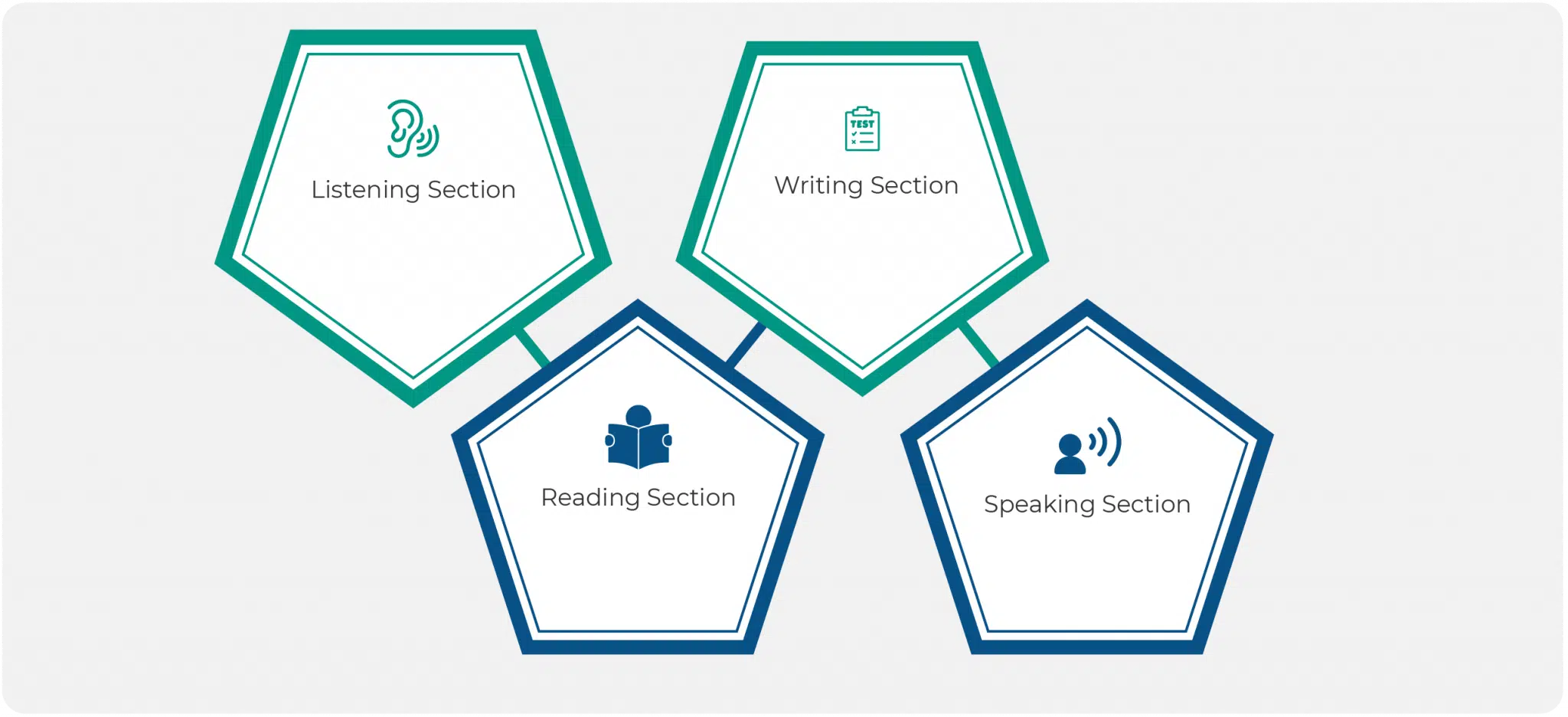
Section-1: IELTS General Training Listening
During this section, you will listen to four recordings and then write your answers.
- Recording 1 is a conversation between two people in an everyday context.
- Recording 2 is a monologue in an everyday context.
- Recording 3 is a conversation between four people in an educational context.
- Recording 4 is a monologue on an academic subject.
Task types: The total number of questions is 40, based on the order of recordings heard in the audio. The tasks include multiple choice, matching, sentence completion, chart summary completion, plan, and diagram labeling. Each question is worth one point.
Answers: You will first have to write the answers on the question paper, but at the end of the test, you will be given 10 minutes to write your answers on the sheet. Make sure you write the answers carefully as incorrect grammar and spelling lead to a deduction in points. Obviously, in the computerized version, your answers are immediately recorded.
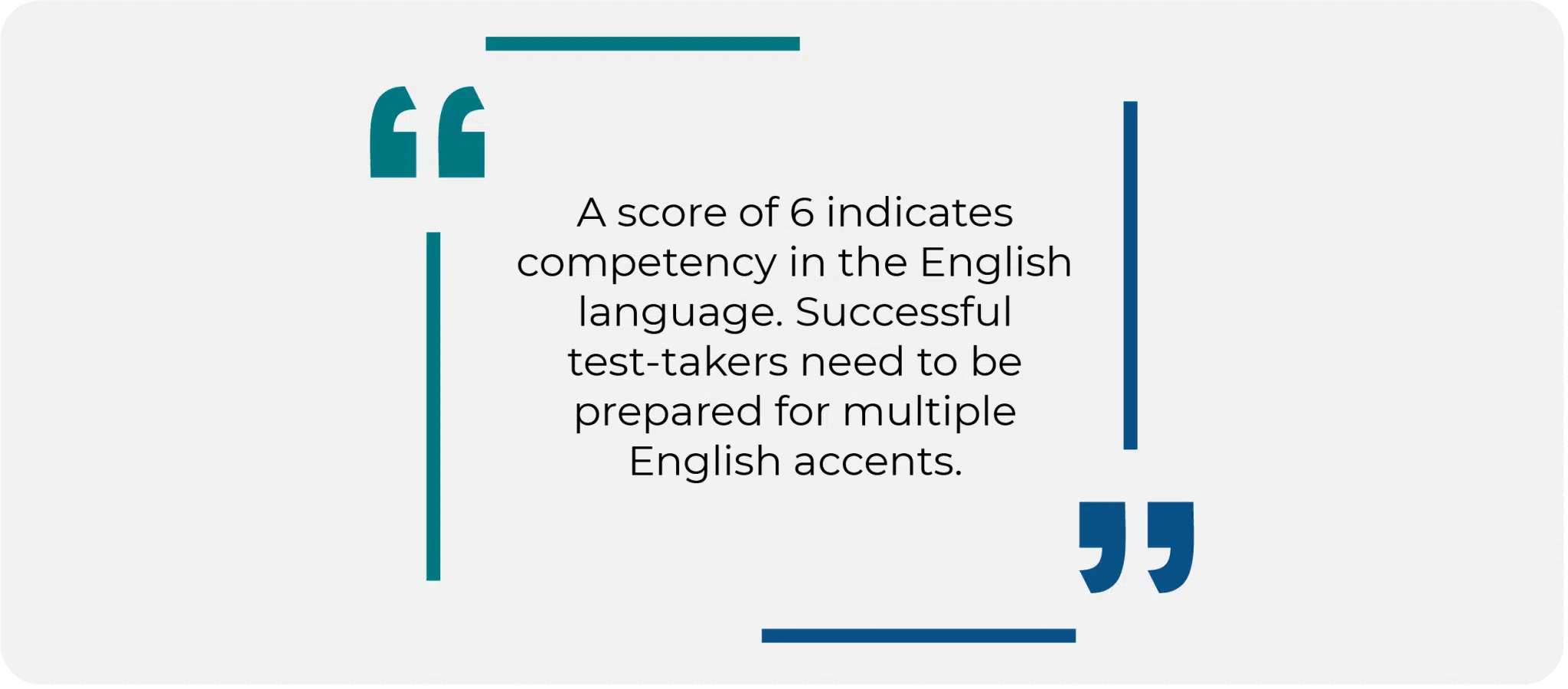
Section-2: IELTS General Training Reading
The reading section includes three sections. In section 1—“social survival”—you will have up to three short texts such as advertisements, notices, and timetables; in section 2—“workplace survival”—you will have up to two medium-length texts such as job descriptions, guidelines, and training materials; in section 3—“general reading”—you will have one long passage taken from journals, books, and magazines. These questions test you on various reading skills including reading for the main idea, gist, skimming, detail, understanding argument, writer’s idea, and opinion.
Task types: The total number of questions is 40 and their tasks include multiple choice and short answer questions, identifying the writer’s views, matching sentence headings, features, headings, sentence, table, note, flow chart diagram, and summary completion. Each question is worth one point.
Answers: In this section, you will not have extra time to transfer your answers. You are required to write your answers on the sheet as you take the test.
Section-3: IELTS General Training Writing
The writing section has two tasks. The first is to respond to a situation in writing, such as answering an email or writing a letter or directions. The second is to write a short essay in response to an argument. The essay may be either formal or fairly personal in style.
Task types: Completing both tasks is mandatory. In the first task, you will write 150 words in 20 minutes. In the second task, you will write 250 words in 40 minutes.
Answers: Answers must be clear, focused, well-organized, and relevant. Vocabulary, sentence structure, and grammatical level are also assessed. Answers must be written completely. Notes and bullet points will not be accepted.
Section-4: IELTS General Training Speaking
This section consists of an oral interview between you and the test taker. All the tests will be recorded. However, it consists of three parts.
- In Part 1, the test taker will ask you about yourself and topics such as home and family. This part will last for four to five minutes.
- In Part 2, you will be given a topic. You will have 1 minute to prepare. After you are done speaking, the examiner will ask you questions on the same topic.
- In Part 3, you will be asked further questions about the topic in Part 2. This part takes four to five minutes.
Answers: All your answers will be marked based on fluency, coherence, pronunciation, grammatical range, accuracy, and lexical resources.
3. Paper-Based Or Computer
You can take the test in either format. The paper-based tests require you to take the Reading, Listening, and Writing sections of the test at a desk in the official IELTS center. The computer-based tests require you to sit in front of the computer with the questions presented on the screen of the official IELTS test center.
Note: The speaking test is not carried on the computer, but face-to-face under the observation of a trained IELTS examiner.
4. Availability and Language Support
You can take the IELTS general training test in more than 140 countries in over 12,000 different locations.
5. Compatibility
Anyone who wishes to work or study in another country can take a test.
Results Scale and Interpretations
The IELTS is accessed on a 9-band scale-and-report score on the basis of overall as well as individual skills. If you score 9 bands, this means you have complete command of the language, and your use of English is fluent, accurate, and appropriate. However, the “1” band score determines that you are a non-user and have no ability to use the language.

Once the test is over, you will get a score between 1-9.
0 – You did not attempt the test.
1 – You are a non-user who is not capable of using the English language except for a few words.
2 –You are an intermittent user. Moreover, it also shows that you find difficulty in understanding the English language.
3 – You are an extremely limited user; which means you only understand the meaning of said language in environments that you are familiar with.
4 – You are a limited user and are not able to use the complex symbols of the English language.
5 – You belong to the modest user category and have partial command on the language. But you make more mistakes.
6 – You are a competent user and have an efficient command on the English language. You also have the skills to understand the complex phrases of the language.
7 – You are a very good user. Also, you completely understand the language and have an operational command on it.
8 – You belong to the category of very good users. While you have full command of the language, you may interpret some things in unfamiliar situations.
9 – You are an expert! You completely understand the language, you are fluent, and your usage is accurate.
What Score Should I Get on the IELTS?
There are no fixed or passing scores for IELTS. The passing score that is required to pass the test is something that professional bodies, colleges, universities, and immigration authorities decide. Moreover, the level of proficiency required to ensure that you are ready for entering a new country depends on the “standard setting.”
“Standard setting” is a process that decides what IELTS score you need before entering a particular program.
Setting the appropriate “standard setting” for IELTS score comprises four steps:
- The panel poll: This involves discussing the minimum level of English writing and speaking ability, gauging the assessment criteria for writing and speaking tests, and considering sample reading and listening materials.
- Setting standards: The committee of internal groups like employees, teachers from different departments, and language experts set minimum standards.
- Setting minimum score: This involves setting a minimum score to get through the IELTS test.
- Evaluating the decision: Once the panel is done with recommendation-related score requirements, your scores will be evaluated for further experiences.
IELTS Average Scores
These are the test-takers average performance and band scale on both individual and overall skills. The scores are for both Academic and General Training test-takers in the year 2017.
Academic test takers: Mean performance by gender
| Gender | Listening | Reading | Writing | Speaking | Overall |
|---|---|---|---|---|---|
| Female | 6.26 | 6.18 | 5.66 | 5.97 | 6.08 |
| Male | 6.17 | 6.02 | 5.55 | 5.88 | 5.97 |
General Training test takers: Mean performance by gender
| Gender | Listening | Reading | Writing | Speaking | Overall |
|---|---|---|---|---|---|
| Female | 6.66 | 6.27 | 6.15 | 6.62 | 6.49 |
| Male | 6.62 | 6.25 | 6.05 | 6.57 | 6.44 |
IELTS FAQs
The International English Language Testing System (IELTS) an exam that assesses your English skills in four areas—listening, reading, writing, and speaking. There are two IELTS exams, with one major difference. The IELTS General Training Test is a pre-employment test that assesses non-native English speakers’ ability to work or immigrate in an English-speaking country.
The IELTS Academic Test is a pre-admission test that you will be required to pass if you want to be admitted to a university in an English-speaking country. This test shows universities and companies that you are able to function in English and be an asset to them. Scoring high will help you move on to the next step in your career.
The computer-based or paper-based IELTS Test is comprised of four different areas, each with multiple tasks:
1. Listening section – multiple-choice, matching, sentence completion, chart summary completion, plan, and diagram labeling
2. Reading section – multiple choice and short answer questions, identifying the writer’s views, matching sentence headings, features, headings, sentence, table, note, flow chart diagram, and summary completion
3. Writing section –two writing tasks: 150 words in 20 minutes and 250 words in 40 minutes
4. Speaking section – an oral interview with three parts
You will be given a total of 2 hours and 45 minutes to complete the test: 30 minutes for the listening section, 60 minutes each for the reading and writing sections, and 11-14 minutes for the speaking section.
Your final score will be on a scale from one (did not attempt the test) to nine (fluent in English).
IELTS Test Tips
IELTS, in a nutshell, is a testing system that checks your English language skills through four aspects; how you listen, read, write, and speak. Although the test parameters seem to be easy, it is not. Here are some tips to ace it in the first attempt.
1. Understand the test format thoroughly
Before you attempt or register for the IELTS exam, make sure you understand the format of the test. Furthermore, equip yourself with the question and task types for each section. It’s also essential that you are aware of all the IELTS rules and regulations.
2. Practice IELTS sample tests
The sample tests give you a clear idea of what you can expect in all four sections. So, try to practice through them as much as possible. Analyze your strengths and weaknesses and allow yourself more practice time and effort in areas of difficulty.
3. Complete tests under time pressure
Complete tests in under 2 hours and 45 minutes as it will give you an understanding of your capabilities. The more you practice under a time constraint, the better the results.
4. Know your weaknesses and strengths
Only you can figure out your weaknesses; so practice as much as possible. There are students who find reading the trickiest part; however, others dread writing. Identify your weaknesses and work on them. Practice lots of questions to score high!
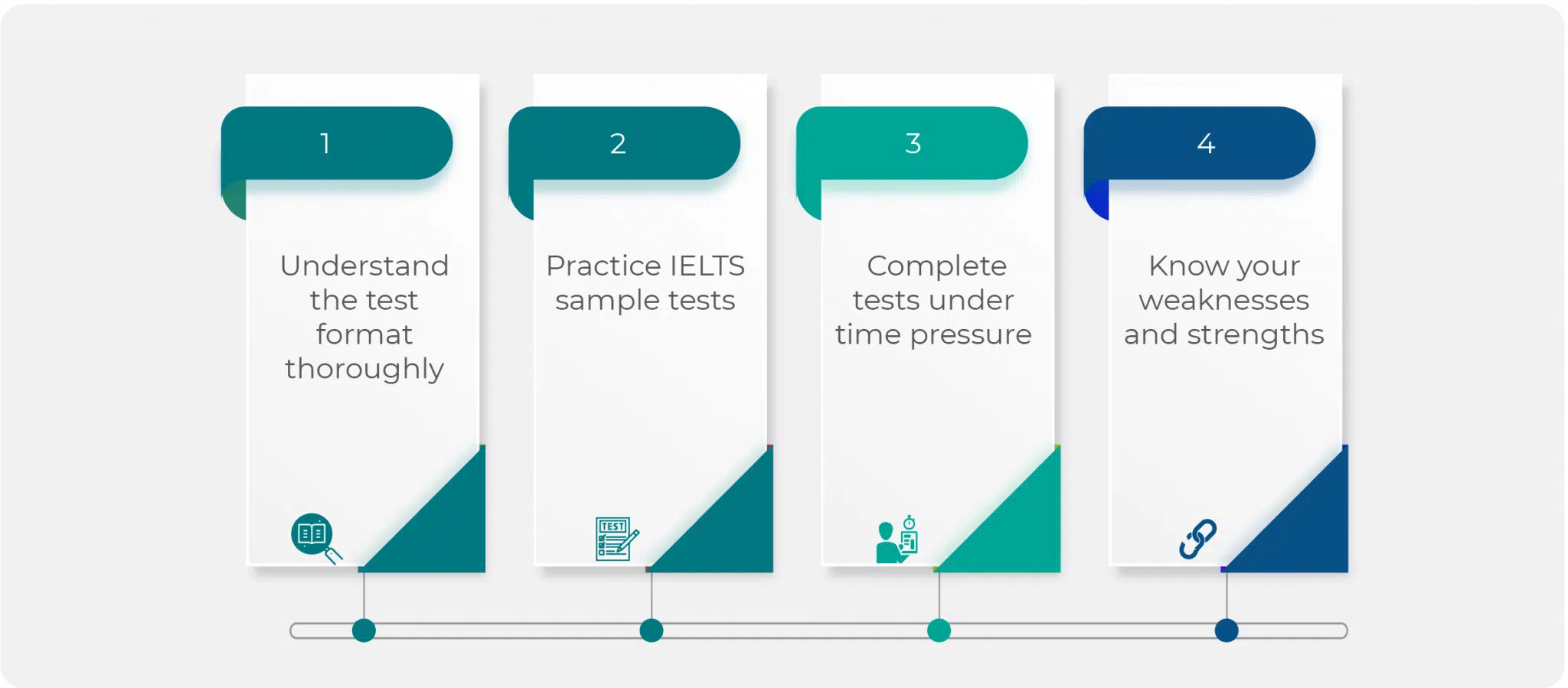
Administration
Is the IELTS General Training Test Online or Offline?
You can take the IELTS general training exam in both online and offline mode. While offline you need to visit the center of the exam, for the online test, you only need to go to the official website.
Is the Test Taken Individually or by a Large Group of Candidates?
Anyone can take IELTS general training test. Whether you are a single student or you are taking the test in a large group, you can do so with ease.
Are Results Generated Instantly upon Completion?
No, you have to wait some time to know your scores. While the results of the online test will arrive up to 13 days from the test, offline test results might take up to 4-6 weeks.
Test Provider
IELTS test is provided by the British Council, Cambridge English Language Assessment, and IDP: IELTS Australia with the joint efforts of experts across the world. The other test providers are from New Zealand, Canada, Australia, the US, and the UK. Moreover, it is trusted by universities, governments, and businesses around the world.
Information Sources
- IELTS – The International English Language Testing System
- Cambridge English Language Assessment
- British Council, IDP
Disclaimer – All the information and prep materials on iPrep are genuine and were created for tutoring purposes. iPrep is not affiliated with the Cambridge English Language Assessment, the British Council, IDP, or any other company mentioned.
Free IELTS practice test: Get to know what the IELTS General Training Test will be like by practicing with these sample questions:
Question 1 of 8
Listening practice: Listen to Janet providing her contact details.
Write no more than one word and/or a number for each answer.
The correct answers are as follows:
- Williamson
- 3700138
Transcript
B: I guess you’ll need my contact details.
A: Yes, your name and a telephone number, please.
B: Janet Williamson (7).
A: Janet Williamson, okay.
B: And I’ll give you my work number, that’s at the First Commercial Bank, 3700138 (8).
A: 3700138. Well, that’s all we need. We’ll see you on Saturday then.
B: Thanks.
Question 2 of 8
Reading practice: Read the passage on Japanese Samurai and European Knights and answer the questions that follow.
The Samurai of Japan and European Knights

Japanese and European medieval societies developed along similar feudal lines and in both, a warrior elite emerged as the dominant force. In both parts of the world, honor played an important part in their cultures, and knights and samurai were expected to follow their respective warrior codes, the “Chivalric Code” in Europe and “Bushido” (way of the warrior) in Japan.
In both Europe and Japan throughout the Middle Ages, the sword was considered the most noble weapon and would contain spiritual significance to the warrior. The samurai famously believed that the legendary samurai sword contained its owner’s soul and according to Richard Cohen in his book, By the Sword, the same sort of importance was put on the medieval knight’s sword, which was believed to possess the essence of the warrior’s inner power and true nobility…..
(Note that the passages in the actual test, as well as the passages within the practice pack, are much longer)
Questions 1 – 2 Complete the sentences below.
Choose no more than two words and/or a number from the passage for each answer.
1. Both Japanese samurai and Medieval knights valued the importance of .2. The sword in both Japan and Europe was said to be a .
The correct answers are as follows:
1. honour, honor (either spelling is acceptable)
2. (most) noble weapon (words such as “most” can be added as long as they do not exceed the number of words specified in the instructions)
Question 3 of 8
Writing practice: Which would not be an appropriate scenario for this letter?
A friend sent you an e-mail asking you to babysit on the weekend. Write a letter in response to the request.
- You could not babysit because you were going away for the weekend.
- You could not babysit because your best friend was getting married that day.
- You are able to babysit and provide possible alternatives for entertaining the children.
- You are going to spend the whole weekend doing homework.
The correct answer is D.
Explanation: A student usually won’t have so much homework that will spend the whole weekend on homework without taking any breaks. In addition, usually it is very young children that require babysitting and they will usually either sleep early or watch a video allow the student to study while they are babysitting if they choose to.
Answers A and B are common situations that arise for babysitters.
Answer C is a common way for babysitters to show that they care for the children they are looking after.
Question 4 of 8
Writing practice: Which is the best opening sentence for the following question?
Your newly renovated house has some problems. Describe the problem to the company that was responsible for the work and ask them to resolve the problems.
- I am writing to you in regards to the cracks in the wall of my kitchen, which was recently decorated by the Home Decoration Company.
- I am writing to you in regards to the cracks in the wall of my recently decorated kitchen.
- I am writing to the Home Decoration Company in regards to the cracks in the wall of my recently decorated kitchen.
- I am writing to the Home Decoration Company in regards to problems with my recently decorated kitchen.
The correct answer is C.
Explanation:
Answer C gives complete details of who is being written to and why the letter has been written.
Answer A is incorrect because of the inefficient use of language. The use of “you” is unnecessary and should be replaced by the name of the company allowing the phrase “which was recently decorated by the Home Decoration Company” to b removed from the sentence.
Answer B is incorrect because it does not refer to the company that did the work.
Answer C is incorrect because it does not specifically describe the problem.
Question 5 of 8
Writing practice: Which of the following is the best final line and sign-off for a formal letter where the writer has drawn attention to a problem?
- Please address this problem immediately, Yours faithfully, Dr. Simon Jones.
- Thank you for your attention, Yours faithfully, Dr. Simon Jones.
- Thank you for your attention, Cheers, Dr. Simon Jones.
- I hope you can get around to fixing this soon, Yours faithfully, Dr. Simon Jones.
The correct answer is B.
Explanation: Answer B is the correct answer because the final sentence and signoff are formal.
Answer A is incorrect because the tone is too demanding.
Answer C is incorrect because the signoff is far too informal for a formal letter.
Answer D is incorrect because the final sentence is too informal and does not display sufficient urgency.
Question 6 of 8
Speaking practice: At the beginning of the conversation, which is not the best way to explain what you do?
- “I am a university student.”
- “I am working as an accountant in a small firm that imports car parts.”
- “I’m studying economics at the University of Chicago.”
- “I’m currently preparing to go overseas to study English in Australia.”
The correct answer is A.
Explanation: A is the correct answer because the speaker has provided no detail about what they are studying making it impossible for the listener to imagine what they are doing.
Answer B and C are not the correct answers because in both cases the speaker has explained what they do and where they do it.
Answer D is incorrect because although this response has little specific detail, the listener can get at least a basic sense of what the speaker is doing.
Question 7 of 8
Speaking practice: Which is the best sentence for the following question?
Describe something that you would like to do but don’t have time for.
- “I’d love to have the time to walk the length of the Great Wall.”
- “I’ve always wanted to learn Italian, but learning a language takes much more time that I can afford.”
- “If I had more time I would like to learn how to sew and make my own clothes.”
- “I am distantly related to Sir Edmund Hillary so I’ve always wanted to climb Mt. Everest.”
The correct answer is D.
Explanation: D is the correct answer because it is the only sentence where the speaker has explained why they would like to do the activity that they don’t have time for.
Answers A, B and C are not correct because these sentences describe what the speaker wants to do but not why.
Question 8 of 8
Speaking practice: The conversation revolves around the topic “Is it better to rent or buy your home?”
Which part of a response is best describing a single idea?
- “It is better to rent because if you change jobs and need to move to a different city it is much easier. For instance, I have a friend who just got a new job in Colombo and if they had bought a home where they are living now, they would have lost a lot of money because they would have been forced to sell.”
- “For people who are young and mobile, it is better to rent because if they change jobs and need to move to a different city it is much easier.”
- “For people who have families, it is definitely better to own their home as it will give their children security. For example, my next-door neighbors have two primary school-aged children and if they are forced to leave it could become very difficult for them as there are few suitable rental properties in the area of the right size.”
- “It is better to rent because if you change jobs and need to move to a different city it is much easier.”
The correct answer is C.
Explanation: C is the correct answer because the speaker has clarified which group of people they are referring to and have given a personal example.
Answers A is incorrect because the speaker has failed to say which group of people was being referred to and implies that all people are likely to suffer from this problem, whereas some people with families would choose never to move to a different city to work because it would mean disrupting their family, while some people who chose to move would not need to sell their existing home because their financial situation might be good enough so they can rent it out. A further weakness is that the speaker refers to “where they are living now” add did not provide a specific location.
Answers B and D are not correct because neither includes an example.
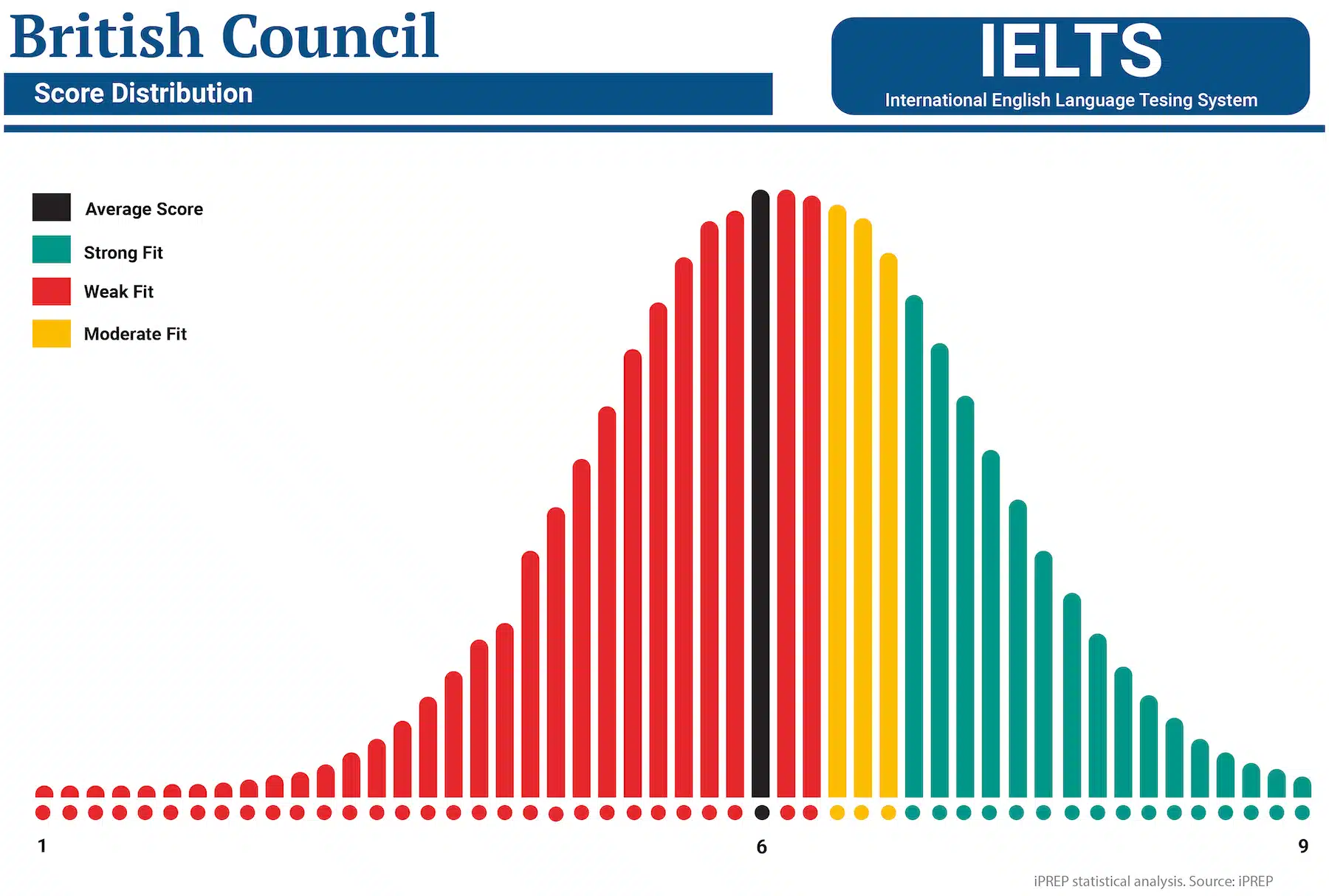
Well done!
You have completed the Sample Questions section.
The complete iPREP course includes full test simulations with detailed explanations and study guides.
‘…TESTS THAT ACTUALLY HELP’

In the first 30 minutes of use I have learned so much more than skipping along the internet looking for free content. Don’t waste you time, pay and get tests that actually help.
Richard Rodgers
January 28, 2020 at 7:49 PM
About the course
Welcome to iPrep’s 7-Day IELTS Preparation test course.
This course will help you develop your skills and with it your confidence in your upcoming IELTS (International English Language Testing Systems) test. IELTS is an English aptitude test and contains individual components for Reading, Writing, Listening and Speaking. Students will be given a Band score (from 1 to 9) in each area and given an overall score. IELTS is used worldwide to prove students English Language proficiency for a variety of purposes including to meet university entry, migration and work requirements. The course will provide you with the following tools and benefits:
- You will become familiar with the test’s various types of questions.
- You will be introduced to each type of question and will be provided with a great variety of helpful strategies for the different types of questions.
- You will develop useful language skills that can be used beyond the IELTS exam and will assist you in many real-life situations including at work and in social situations. A key focus of the course is to assist students in using their existing language skills more effectively.
By the end of this course, you will be more knowledgeable and comfortable with the aptitude test – Knowledge and familiarity with the test are the two most significant factors that can help you maximize your score and improve your chances of success.
58
Learning hours
5
Practice tests
910
Questions
30
Day access
The course is comprised of both practice and learning sessions. We will guide you through learning lessons with essential information about your upcoming IELTS test. These lessons will help you understand the underlying strategies that are essential for succeeding in the test.
The course includes not only strategies to help you improve your understanding of IELTS requirements but also assists in avoiding common pitfalls.
Wishing you an enjoyable learning experience!
Skills you will learn
IELTS Writing
IELTS Reading
IELTS Speaking
IELTS Listening
Curriculum
- Course Introduction
- Writing – General Training Task 1
- Writing – General Training Task 2
- Writing Topic Ideas – Bonus Material
- Speaking
- Speaking – Exercises
- Listening – Introduction & Strategies
- Listening – Question Types
- Listening – Full-Length Simulations
- Reading – Introduction & Strategies
- Reading – Question Types Introduction
- Reading – Full-Length Simulations
- Course Conclusion
About the authors

Ph.D. Bruce Smart
Bruce spends his time in China teaching IELTS, TOEFL and SAT working with Propel Academics (展程出国留学培训中心) as partner and Director of Studies in Zhongshan, Guangdong. He is also involved in IELTS course preparation, training IELTS teachers and online teaching.
He is the founder of Yasi Learning and has published a book of IELTS essays “IELTS Writing Band 9 Essays” which is published through Strong and Bold publishing.

PgD Mike Wattie
Mike has been an IELTS tutor for over 15 years in Australia and Taiwan. He has published many books and articles on IELTS speaking and writing. In addition he has a website to help students prepare for their IELTS test at: IELTSanswers.com.
He has a long established career in language centers and universities in the field of English test development and assessment. He has a Master degree in Management and a Postgraduate Diploma in Education.
Customer Testimonial

Awesome Stuff…! Best Online course ever with detailed explanation…! Definitely a 5 star…! Would recommend it for everyone who wants to pass the ILETS Exam in one go…!
John Klein
November 3, 2019 at 1:51 PM
Reviews

Kwabena B*****
July 24, 2024 at 12:00 PM
Initially I was thinking this study is going to be a smooth one but looking at the questions and their various answers my personal perspective has really changed. I’ve got to realize that you need to pay critical attention to the headlines so you can be able to solve the questions and I must say that your lessons have really been that helpful as it has helped me to understand better how to go about each scenario. Thanks a lot for this opportunity.

Olukayode S*****
July 2, 2024 at 8:46 AM
I was planning on taking the test, but decided to look into what test review courses have to offer, that is when I stumbled on i-prep; It was the most rewarding experience, I ever had, the reviewers pulled me up into the the world of understanding about what the test is all about and how to ace it! Suddenly I rose from being a novice with all the anxiety of failing to be competent and eventually an expert. Thank you I-Prep, you're the best

Edidiong E*****
March 8, 2024 at 9:16 AM
I have used this site for the past two days and it has been so insightful and preparing me for my upcoming test. I recommend 100%

Sushant P*****
April 7, 2023 at 3:41 AM
The IELTS material was thorough, easy to follow, and provided valuable insights for improving my exam performance. Highly recommended for anyone preparing for the test.

Hyacinth M*******
January 4, 2023 at 6:25 AM
the design and graphics for the training on the portal is Superb ,selected wrong answers and mistakes have been well explained at the end of the questions

Tsitsi S********
November 30, 2022 at 12:09 PM
This course is so useful and very detailed, I feel confident that I will pass my exam and thank you so much.

ABILASH REDDY C**********
August 23, 2021 at 2:07 AM
Great material and simulation tests. The lectures are in depth and questions are prepared such that they are fairly challenging.

Richard A****
June 28, 2021 at 5:16 AM
Purchased the course not long ago and I am very happy how the structure of the course is. The course is awesome and so far so good. I think would this my score would definitely be aced...

VIKRANT A******
June 9, 2021 at 3:25 AM
The course contains detailed explanation of all the sections included in the exam, which helps to understand the sections thoroughly.

Chengyi h****
May 14, 2021 at 4:23 PM
You know, free things usually turn out not to be the cheapest ones. In terms of preparing for the IELTS tests, iPrep offers the most useful courses which save preparation time. Therefore, such courses are highly recommended.
